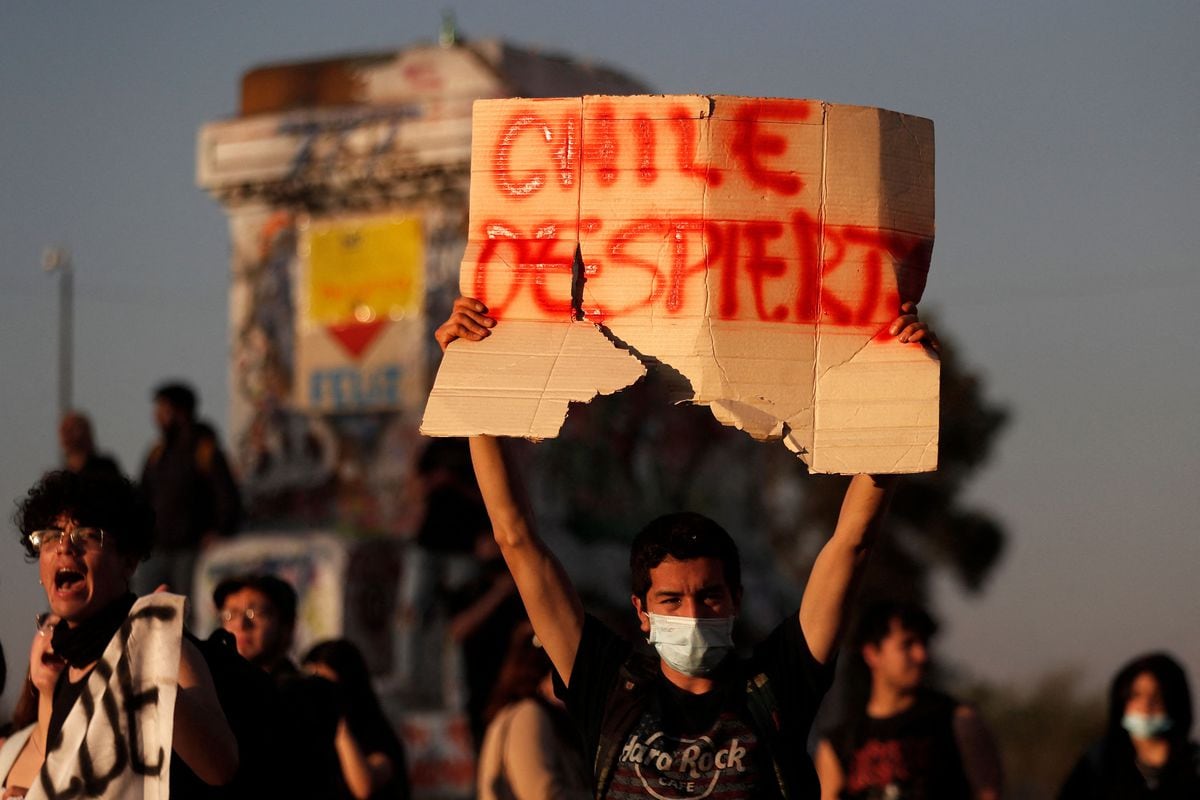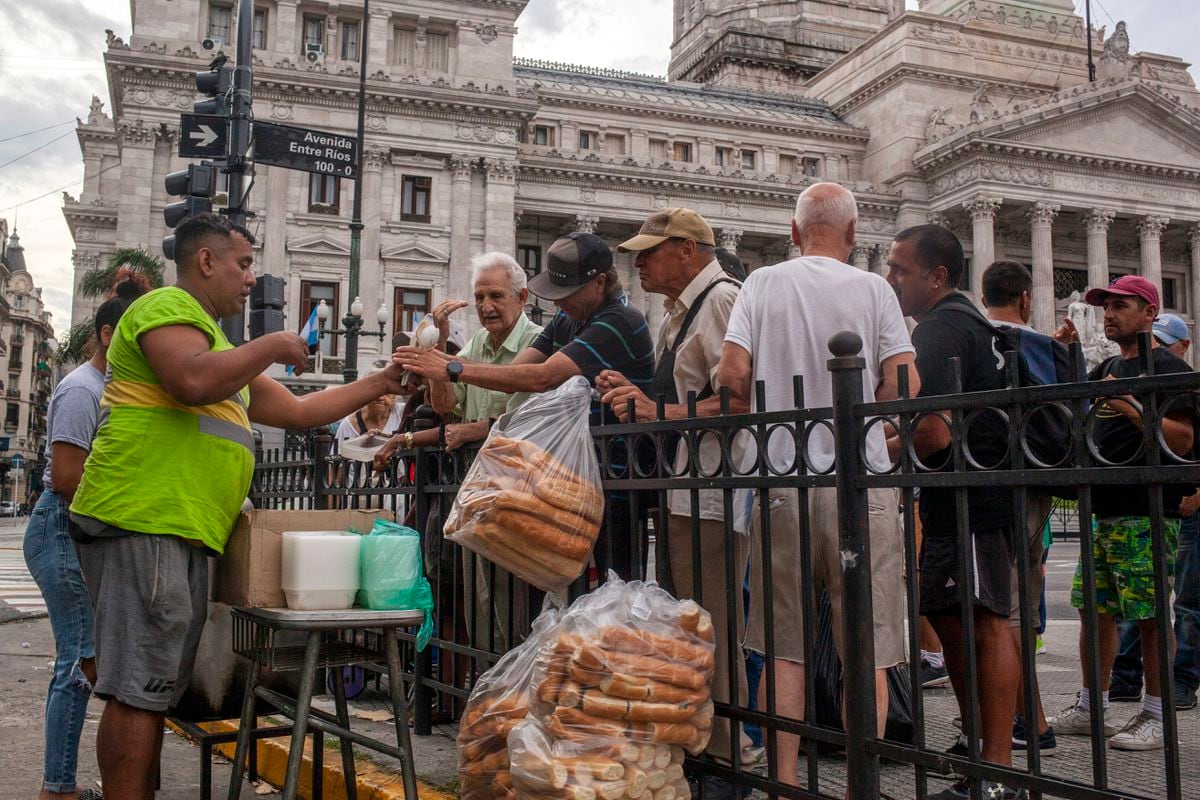A demonstrator raises a sign that says "Chile, wake up", in a demonstration in favor of another constitutional process, this Monday in Santiago. JAVIER TORRES (AFP)
In December 2019, the streets and squares of downtown Santiago continued to fill with protesters every afternoon.
It was then the second month of the social outbreak and for a militant tourist like me that popular spectacle appeared at first sight as something beautiful and hopeful.
“Chile woke up”, people sang with pitch tune, jumping, playing drums around the painted and almost unrecognizable statue of Baquedano.
A few meters away, with the same punctuality as the demonstrators, police vehicles appeared, ready for a new day of brutal repression.
However, once the emotion of the first bars had passed, it was impossible not to perceive that, after almost eight weeks of demonstrations, the theater of the street explosion had acquired an air of stagnant routine, an almost choreographic quality where the actors tirelessly resumed their respective roles. , their costumes, their chants, their weapons.
The streets literally burned, but nothing seemed to predict that the energy of the show would exceed the order of the day.
The opposing forces that stirred in the streets, no matter how much intensity they put into their role, added up to zero.
Perplexed, one wondered in what direction all that phenomenon would be unleashed, where it would lead.
In those days, during a conference at a university, we were discussing the aesthetic languages of the revolt.
Interesting things were said about the insurrection as a work of art, but when it came time to glimpse a resolution of the
performance
, a political outlet for a political problem that until now had produced predominantly aesthetic signs, the message that this was it prevailed.
That is to say, that the only possible political discourse was the mobilization itself and that anything that smacked of institutions, parties and leadership would be immediately branded as a betrayal and a setback.
And precisely that was the language used in those academic and militant circles to describe what had taken place on November 15 of that year, when the agreement for social peace and the new constitution were concluded.
That is, the crowd, once again, had been betrayed by politicians, eager to steal the spotlight.
performance
_
daily around the multicolored Baquedano thus acquired an almost sacred status, imbued with a religiosity that only admitted a deictic language: hela there, they said, pointing with their fingers.
There it is, look at it.
And nothing as vulgar as a constitution, nothing as sordid as party politics, could hope to reflect something so supreme, they said priestly.
At best one could cite Negri, Deleuze, Bifo and other theorists of narcissistic defeat: multitude, war machine, rhizome, deconstruction.
But, institutions, state, pacts, negotiations?
No, thanks.
That was high treason.
After the defeat in Sunday's plebiscite, I keep thinking about that word, betrayal, and its twin sister: translation.
Both words share etymology, you know.
And I am inclined to think that what has just happened in Chile is due to an unfortunate confusion between the meanings of these two words.
Because, in effect, although everything beautiful that was happening in the street cried out for an institutional reflection, the consolidation of some leaderships and a determined articulation between the social movement and parties, the so-called radical militancy had already decided that there was no possible translation, just betrayal.
translator, translator
, they shouted, watching the destituent carousel turn towards its own disintegration.
I also think of the role of Gabriel Boric then and now and I have no doubt that history is being tragically unfair to the current president who, very early on, had the courage and responsibility to offer himself as an interpreter.
In the days after that November 15, when the pale horizon of a constitution entered the scene, Boric was attacked by a group of protesters shouting traitor.
An ingratitude against the then young congressman, who had only proposed to translate, in the midst of such chaos, the gestures of discomfort into the language of the republic, rage into method, aporia into an opening of meaning.
Last Sunday's defeat leaves many lessons for the new progressive forces that are beginning to emerge on the continent, lessons about their own communication strategies and those of the adversary, about the endless work of translating to educate free citizens (not translating with calculated bad faith, with deceit and misinformation, as the Rejection campaign did), lessons about the need to match certain contemporary demands with popular sensibilities.
But above all, it confronts us once again with the opportunity to insist on the reconquest of the institutions by the subaltern sectors that have been leading the uprisings.
The state is not a mere apparatus of normalization and discipline at the service of the oligarchies.
We are all the state and it is time for us to take charge.
50% off
Subscribe to continue reading
read without limits
Keep reading
I'm already a subscriber









